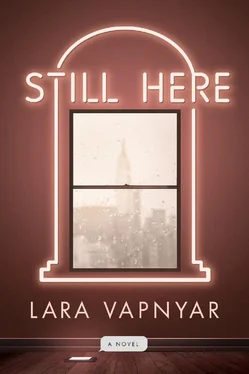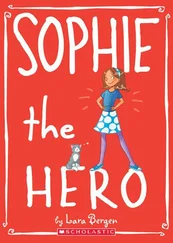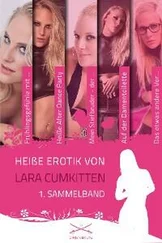Regina said that she did.
Nobody talked much over breakfast. Masha looked tired and Nastya was still sulking, and Regina kept adding spoonful after spoonful of cherry jam into her bland kasha.
Regina was about to say that she was leaving when Aunt Masha asked if she could watch Nastya for an hour or so, while Masha went to a doctor’s appointment. Regina had a quick paranoid thought that this was a setup, that Masha would just disappear and Regina would be stuck with taking care of the girl forever. But that would be ridiculous, wouldn’t it? And so far Aunt Masha hadn’t even mentioned the subject of adoption. She must have finally accepted Regina’s objections.
“There is a suitcase with a few of Olga’s things under my bed,” Aunt Masha said before she left. “Look through them. You might want to take something.”
Aunt Masha’s room was long and narrow, with a door opening onto the small glassed-in balcony, filled with some old boxes, burlap sacks, and dusty jars. All the furniture was put in two rows lining the walls. Bookcases on the right side. Masha’s rickety desk, her narrow brass bed, and a small couch that must have served as a bed for Nastya on the left. In the little corner by the door, there were a kid-size table and chair, a toy piano, a tiny makeshift dollhouse, and a few easy-to-reach bookshelves. Most of the books there used to belong to Regina, but she knew better than to comment on it, especially since Nastya was crouched by the shelves with a defiant expression. She seemed to be prepared to guard her belongings. Regina noticed that she had moved her little table so that it now blocked access to her corner.
“Nastya,” Regina called, but she turned away from her.
Fine, Regina thought.
She reached under Masha’s bed and dragged the large leather suitcase out. When she opened it, the smell of mothballs was so strong that her head started to hurt.
“It smells like rats,” Nastya said.
There was her mother’s old fur hat on top. Faded to gray now, but still fluffy. Regina pressed it to her face, trying to ignore the smell.
It was really soft, achingly soft.
She buried her face into the fur and moaned. “Mama.”
“Is that your mama’s hat?” Nastya said. She was standing right next to her.
“Yes, it used to be my mom’s hat,” Regina said. “She died.”
Nastya furrowed her forehead and looked at Regina intently.
Was she not supposed to say that to a child? She wasn’t! Clearly she wasn’t. Perhaps Nastya didn’t know what “died” meant. How could she possibly know that? But it turned out that she did.
“I know,” Nastya said, “Masha told me. She is in the grave. My mama is in the grave too.”
Regina reached out her beret-clad hand to Nastya. “Do you want to pet it? It’s soft like a kitten.”
Nastya edged over, touched the beret with the tips of her fingers.
“No, like a bunny,” she said. “We had a bunny, where I lived before. It got sick and then it got dead.”
“Do you want to see what else is in there?” Regina asked, pointing to the suitcase.
Nastya nodded and knelt on the floor next to Regina. “What is that?” she asked, pointing at the round tin box buried between two sweaters.
“Let’s look,” Regina said.
Nastya took the box and tugged on the lid. It wouldn’t budge. This was an old blue and white tin box with the golden letters BELUGA CAVIAR. Something jingled inside.
“Pirate coins!” Nastya said.
Regina couldn’t open it either. She got a knife from the kitchen and hooked it under the edge of the lid. The lid gave in and jumped off the box and onto the floor.
“Ah!” Nastya cried as if she had discovered a much better treasure than either diamonds or gold coins. “Buttons!!!”
Nastya climbed off her chair, took the box from Regina, and set it on the floor. She then sat cross-legged down next to the box with her back very straight. Her thin greasy hair was done in a braid, so short that it stuck out on the back of her head. Her neck was long and skinny and not very clean, with a hollow in the middle that made her look especially fragile.
Was that how I had looked to my mother when I sat and played with those same buttons? Regina wondered. She sat down next to Nastya and stroked her thin shoulders.
That was what Aunt Masha saw when she came back from her appointment. The two of them sitting on the floor together playing with buttons. She couldn’t have been more pleased.
“Let’s go for a walk, girls,” she said.
Regina looked at her watch. “Twenty minutes, and then I’m leaving.”
“Suit yourself,” Aunt Masha said.
Nastya had a virtuoso way of dressing. She sat down in the middle of the floor, pulled on her boots, stood up, and stomped on each foot to make them fit tighter. Then she put her knitted hat on, tied the strings, and made a neat bow, centrally located under her chin. The next step was to put on her coat, which had a system to it too. She pulled on the ends of her sweater sleeves, squeezed them in her fists, and only then started pushing her arms through the sleeves of her coat.
“Good, Nastya, good,” Aunt Masha said. “You don’t want your sleeves all bunched up inside your coat.”
In a few seconds Nastya was all buttoned up and standing by the door, holding her sand pail, her slightly battered Barbie, and an assortment of sand tools.
In the daylight, the neighborhood looked even worse. The entrance of the building was half blocked by the overflowing garbage bin, and there were three stray dogs picking at the garbage without much hope in their eyes. One of the dogs growled at them. Nastya grabbed onto Regina’s thigh, hurting her.
“Regina, take her hand!” Aunt Masha ordered.
Regina was amazed at how light Nastya’s hand turned out to be. Warm, weightless fingers, so thin that Regina was afraid that she’d accidentally squeeze them too hard. She realized that she had never led anyone by the hand before. She marveled at how much intuitive precision was required to make this simple action work. You had to communicate direction by the tiniest pressure of your fingers, and you were entirely responsible for the person you led.
They crossed the street and walked to the neglected playground, with a couple of rusty swings, a broken seesaw, a sandbox, and a strange contraption that looked like a huge rotating birdcage. There were two small children in it, and another older child was pushing the thing counterclockwise, producing a horrible screech. Nastya let go of Regina’s hand and ran toward the sandbox.
Aunt Masha went to sit down on the bench; Regina joined her. It was strange how she could still feel the warmth of Nastya’s fingers in her palm. One of the stray dogs ran up to them, and Aunt Masha reached into her purse, took out a piece of bread with cheese, and fed it to the dog. Then she stroked its grateful muzzle, and the dog lay down and curled at her feet.
“Are you sure you have to leave tonight?” Aunt Masha asked.
“Yes, I have my ticket.”
“I really hoped you’d spend more time with us.”
“Well, I need to get back,” Regina said.
Aunt Masha took a large handkerchief out of her pocket, blew her nose, and folded it back into her pocket.
“Then we will have to talk now,” she announced. There was an ominous note in her voice and Regina didn’t like it one bit.
She turned to Regina and took her hand. “Regina, I want you to adopt Nastya.”
Yes, up until that day Regina had been expecting something like this. But as her time in Moscow was coming to an end, she’d stupidly allowed herself to relax. She’d allowed herself to think that the danger was past and Aunt Masha wouldn’t bring up the subject of adoption.
Regina was shocked and she reacted as she always did when shocked. She started to laugh. Right there on that stupid old rusty playground she was shaking with an idiotic, sputtering, unstoppable laughter.
Читать дальше












